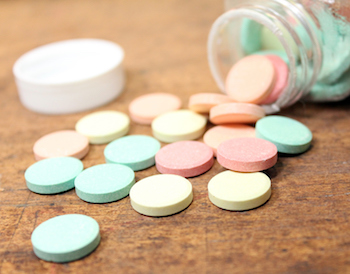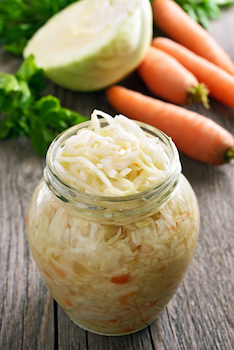Stay Informed
Popular Articles
- Hiatal Hernia: Hidden Cause of Chronic Illness
- Small Intestinal Bacterial Overgrowth (SIBO)
- Applied Lymphology: Unlocking the Secret to Pain Relief
- An Introduction to Constitutional Iridology
- The Low Down on Liver Detoxification
- An Energetic and Emotional Approach to Cancer
- Fat Facts
- Marrow in the Bones
- Blood Type and Nutrition
- Cardiac Herbs: Beyond Hawthorn
Quick Search
The School of Modern Herbal Medicine




The Digestive Process and Modern Diets
- 12/13/2008
This is page two of a three page article...
 To further understand the importance of enzymes (and why we need them), it helps to understand a little about the digestive process. Here are some essential facts.
To further understand the importance of enzymes (and why we need them), it helps to understand a little about the digestive process. Here are some essential facts.
Digestion begins in the mouth, with the teeth and the saliva. Most Americans eat too fast. I have a tendency to eat too fast, but I've been learning to slow down and getting better at it. When you eat more slowly, you enjoy your food more. You also get “full” quicker as your body has time to register that you've had enough to eat. This helps you lose weight. It also helps your food digest better and that makes you healthier. However, the fact that most American's eat too fast, means that digestive enzymes can at least help them make up for this problem.
Digestion continues in the stomach with the secretion of hydrochloric acid and pepsin. With all the ads on TV about antacids and acid blockers, you'd think that acid in the stomach is a bad thing. It isn't, it's a very good thing. You need hydrochloric acid (HCl) to break down proteins properly and you also need it to absorb minerals like calcium, magnesium, zinc and copper. Also, HCl is part of your pH buffering system. It may sound crazy, but neutralizing your stomach acid actually makes your body more acidic.
The interesting thing is that most people who suffer from acid indigestion are actually acid and enzyme deficient. If you get burning pains in your stomach about one hour after eating, then you don't have enough digestive secretions to break down your food. Taking plant enzymes with meals will actually help this.
I sometimes get this type of acid indigestion, especially when I mix heavy grains with meat. I can eat grains and vegetables and vegetables with meat, but I don't do well with a lot of grain and protein. Here's how I deal with the problem—I take Digestive Bitters. I really love the bitters from Urban Moonshine, but there are other good brands, too.
I've also used a glycerine extract of golden seal or goldenseal powder straight from the capsules (open them and dump the powder in your mouth). This rapidly reduces the burning pain in my stomach. (I take a little every five minutes with water until I feel better.)
Stomach Acid and Calcium
 And, while we're talking about stomach acid, one of the most ridiculous things people do is to take various forms of calcium carbonate as calcium supplements thinking this will build their bones. Calcium carbonate blocks HCl production in the stomach, which is why it's used in antacid tablets. By blocking HCl, calcium carbonate supplements are also interfering with proper digestion of proteins and mineral assimilation. In other words, it's reducing digestive capacity.
And, while we're talking about stomach acid, one of the most ridiculous things people do is to take various forms of calcium carbonate as calcium supplements thinking this will build their bones. Calcium carbonate blocks HCl production in the stomach, which is why it's used in antacid tablets. By blocking HCl, calcium carbonate supplements are also interfering with proper digestion of proteins and mineral assimilation. In other words, it's reducing digestive capacity.
Even the calcium that is absorbed from calcium carbonate is not in a bound form, which means it isn't very easy to utilize. So instead of going into the tissues and bones, it winds up getting dumped in the urine. This alkalizes the urine and makes people think they are balancing their pH. They aren't. They're really just temporarily buffering the acid, without correcting the underlying problems that cause the waste acid buildup.
pH buffering is more than just getting an alkaline reading on a urine pH strip. You can do the same thing with baking soda and its a whole lot cheaper. Besides, using calcium carbonate to buffer acid increases the risk of kidney stones and calcification. If you really want to alkalize, eat lots of green leafy vegetables. In my experience, they not only supply calcium and buffer pH, they help, instead of interfering with digestion.
I've heard Jack Ritchason talk about “curing” people with acid indigestion by giving them PDA, which supplements hydrochloric acid production. This can also help make the system more alkaline. As I've mentioned earlier, I don't personally like the way PDA makes my stomach feel. I do better with bitters, aromatics and enzymes.
Dietary Considerations
 Since, plant enzymes replace the enzymes we're missing by eating cooked and processed foods, the question naturally arises, should we eat everything raw. It's an appealing idea and makes sense to me on a certain level, however, it hasn't proven very practical for me when I've tried it. I find I do better when I have at least 50%-60% of my diet raw. Some vegetables just seem to digest better (for me) if I cook them. I've learned there is a reason for this.
Since, plant enzymes replace the enzymes we're missing by eating cooked and processed foods, the question naturally arises, should we eat everything raw. It's an appealing idea and makes sense to me on a certain level, however, it hasn't proven very practical for me when I've tried it. I find I do better when I have at least 50%-60% of my diet raw. Some vegetables just seem to digest better (for me) if I cook them. I've learned there is a reason for this.
Human beings lack an enzyme called cellulase. Animals that graze produce this enzyme, which breaks down the cellulose (a fiber) in plant foods and makes the minerals and nutrients available. Light cooking (such as a quick stir fry or light steaming) helps break down the cellulose structure in many veggies and releases their nutrients for absorption. So, some cooking can actually make many nutrients more available to us. So, while I try to eat some raw fruits and vegetables every day, I don't eat everything raw.
Another thing I've learned is that grains, nuts, beans and other seeds are all difficult to digest when raw. In order to hold nutrients in a dormant state, all seeds contain enzyme inhibitors. When the seed begins to sprout, the enzyme inhibitors are deactivated and the enzymes are activated. This starts transforming the nutrients and making them bioavailable.
According to Sally Fallon, in Nourishing Traditions, Dr. Weston Price (author of Nutrition and Physical Degeneration) discovered that all native people's soaked grains, nuts, legumes and seeds before cooking and eating them. Soaking deactivates the enzyme inhibitors and makes the food bioavailable.
Fermented Foods and Enzymes
 She further indicates that bread used to be partially fermented that is, prepared as a sourdough. What this means is that the dough was allowed to sit long enough for bacterial enzymes to partially break down nutrients in the grain before baking. This makes the nutrients in the grain more available for utilization than they are in modern commercial bread.
She further indicates that bread used to be partially fermented that is, prepared as a sourdough. What this means is that the dough was allowed to sit long enough for bacterial enzymes to partially break down nutrients in the grain before baking. This makes the nutrients in the grain more available for utilization than they are in modern commercial bread.
This is just one example of how traditional people used enzymes to their advantage. All fermented foods are enzyme rich foods and were often eaten with other cooked foods. These fermented foods were natural enzyme supplements which supplied the extra enzymes needed to help break down the cooked foods these people ate. These enzyme-rich fermented foods were typically served as condiments with the meal.
Fermented foods include cultured dairy products, such as yoghurt, cheese and keifer. There are also fermented vegetable foods such as cultured soy foods (miso, Natto), pickled vegetables (sauerkraut, cucumbers, Kim Chi) and naturally fermented beverages (traditional beers and wines). Some cultures also fermented animal foods, like fish. Raw apple cider vinegar is another natural fermented food, which has been used to improve digestion.
These foods are not only good sources of enzymes, they also supply probiotics, friendly bacteria necessary for gastrointestinal health. So, fermented foods were not only enzyme supplements, they were probiotic supplements.
Unfortunately, in modern “germ-phobic” society most of these pickles, sauerkraut, fermented beverages, etc. are cooked or pasteurized after the fermentation process, which destroys both the probiotics and the enzymes. This increases shelf life, and prevents the raw E. coli infection that happens when food is mishandled, but destroys most of the benefits traditional societies derived from these foods.
Fortunately, many health food stores sell “raw” fermented products which are enzyme-rich. You can also learn to make your own or take enzyme supplements. After reading Sally Fallon's book, I got some Keifer starter and have experimented with making my own Keifer with raw milk from a local dairy. I blend it with frozen fruit and it is wonderful. I'd like to try making some of the naturally fermented beverages (such as ginger beer) she has recipes for, but I haven't had the time.
I find eating these fermented foods with meals does the same thing for me that digestive enzymes do. For example, if I eat some red meat with raw sauerkraut or kim chi it does not upset my digestive system, whereas, if I eat a typical “meat and potatoes” meal it upsets my digestive tract (unless I take digestive enzymes with it).
On page three I discuss therapeutic uses for enzyme supplements...
